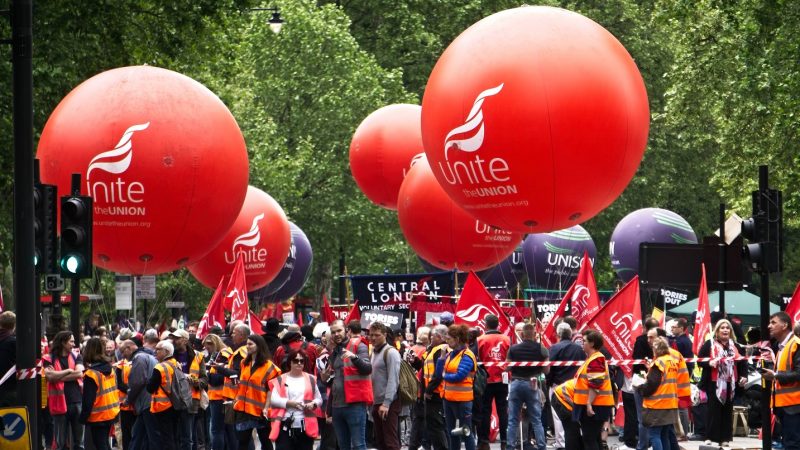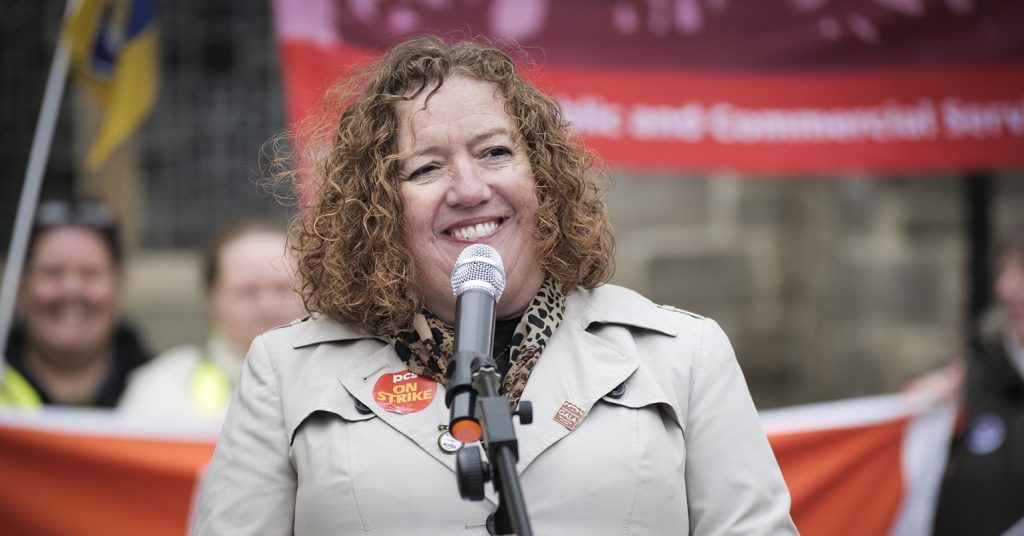The labour movement must take this moment to build a powerful resistance to anti-union laws

It has become commonplace to refer to 2022 as a turning point for organised labour. The year is not out, but already it is being referred to as a year of strikes and industrial action.
This is all relative. Strike days are up from a low base, with 2018 marking a 125-year low watermark in the number of work days lost to strike action. When published this year’s figures will surely be dwarfed by the previous peak of 27.1 million in 1984.
Nevertheless, we are seeing a marked and welcome change in perspective and a renewed appreciation of the importance of worker action to defending social progress.
As we press deeper into autumn, however, we face the growing risk of 2022 becoming another, darker turning point for the UK’s trade union movement.
The prime minister Liz Truss was selected by a tiny, overwhelmingly older and wealthier Tory Party membership largely on the basis of her commitment to tear up people’s rights and freedoms. And the rights of trade unionists to organise, campaign and strike freely and effectively are in the firing line.
Truss and her cabinet have repeatedly stated their desire to introduce so-called ‘minimum service requirements’ in certain sectors of the economy, essentially outlawing all-out strikes and coercing unions into scabbing on their own members. More recently, Truss has declared she wishes to add new bureaucratic restrictions on balloting and striking, all with a view to making industrial action prohibitively difficult to organise.
Let’s be clear: the UK’s trade unionists already face what Tony Blair proudly declared to be some of the most stringent restrictions on industrial action in the global North. UK trade unionists wishing to take strike action have their hands tied. We are told by authorities what we can and can’t strike over, when and where we can do it, and which bureaucratic hoops we have to jump through to make it lawful.
All this has been crafted by successive governments with the express intention of protecting bosses and shareholders. In their calculations, our freedoms of association, speech and agitation are unfortunate obstacles on the path to profit.
If we are not alert, Truss will attempt to make 2022 the year that the labour movement was put back in a box. For the most wild-eyed, deranged acolytes of Tufton Street thinking this is a chance to make an irreversible shift in wealth and power towards capital.
This would be a disaster not only for the people of the UK but for the planet too. As commodity prices soar and generalised ecological collapse gathers pace, we desperately need a force with the power and organisation to formulate an alternative to our failing economic system. In other words, we desperately need a labour movement with the power and confidence to organise, bargain and strike for the health of people and the planet. A popular and confident trade union movement with widespread public sympathy is our best hope – and therefore Truss’ worst nightmare.
The prime minister believes that by tieing the hands of trade unions now, she can prevent this from the outset and safeguard the interests of capitalists for a generation or longer.
The question remains: what will our movement do about this? Will 2022 be a turning point towards a revived labour movement? Or will the year 2022 be remembered as a darker moment, when ambitions of striking for people and the planet were ever more tightly constrained?
The answer may depend on how we respond, right now. The labour movement is rightly concentrated on building strikes against employer assaults on our livelihoods, while campaigns such as Enough is Enough bring previously apolitical people into the fold and channel anger at the cost-of-living scandal.
Winning the near-term political battle to prevent new anti-union laws, however, will also require a public campaign against the laws as such and the brutally unfair workplaces they underpin. A great many unions already have policies committing to public campaigns against the anti-union laws. Now is the time to forge connections in the minds of workers across the country, between the crashing pay and conditions they are facing on the job and the unjust legal restrictions placed on unions.
On Monday 10 October 2022 at 5.30pm, Earth Strike UK and the Free Our Unions campaign is holding a demonstration and assembly against new and existing anti-union laws outside BEIS in London. We are calling for our unions to put a public campaign against the anti-union laws at the very heart of their strategy this autumn and beyond. We are making the right to strike over matters of our choosing, including climate and ecological justice, the very centrepiece of our call to action. We encourage everyone to join us at the demonstration and make your voices heard.
Just last week, RMT General Secretary Mick Lynch asserted that the RMT will be there to defend its members and by extension the whole working class, long after Liz Truss’ career has been extinguished. He is right. But his words must be construed not as a prediction, nor as a prophecy, but as a call to action for all of us.
The RMT of the future – and indeed every worker and their union – needs to be free of legal and bureaucratic constraints on collective action. It is up to us to forge a better terrain on which to keep waging our fight.
Matthew Hull is Trade Union Liaison Officer for the Green Party of England and Wales
PS. We hope you enjoyed this article. Bright Green has got big plans for the future to publish many more articles like this. You can help make that happen. Please donate to Bright Green now donate to Bright Green now.




Well done for cogently expressing the battle that’s ahead for ordinary working people.